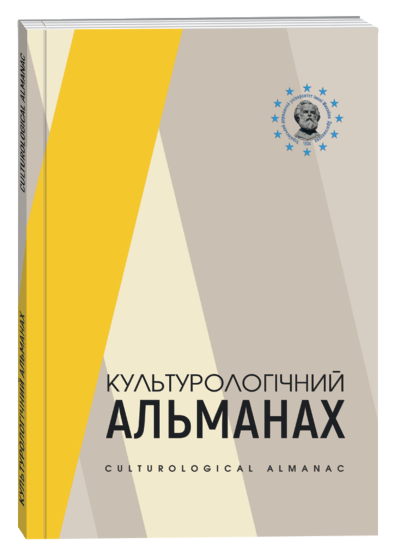MYTHS ABOUT FAMINE IN THE PARADIGM OF SENSUAL EXPERIENCE
DOI:
https://doi.org/10.31392/cult.alm.2022.4.30Keywords:
myth, Holodomor, intangible cultural, Ukrainian cultural, sensual experience, cultural trauma, historical consciousnessAbstract
The representation of the phenomenon of famine in the mytho-poetic dimension of culture is analyzed in the article. Special attention is paid to the tale of the Holodomor of 1932–1933 recorded in the ethnographic region of Ukraine – Podillya. Two modes of famine are distinguished in mythological texts – phenomenological and morally-educational. It is shown, using the example of the mythological cycle about the goddess of agriculture Demeter, that the phenomenological modus of famine tells about the collective death of people due to hunger as a result of natural cataclysms or, wars. While the morally-educational modus is represented by detailed scenes of the individual death of those heroes who were punished by hunger due to non-observance of ritual practices or taboos. Parallels of two modes of famine in Ukrainian folk tales have were drawn. The tale of the Holodomor is considered to be a synthesis of two famine modes in one plot of the myth. Artificial famine is combined with the components of the mytho-ritual practices of cannibalism, which formed the image of starvation, which transformes hunger from the biological plane to the socio-cultural one. With the help of myth the sensual experience of artificial famine is transformed into a symbolic dimension of culture. The influence of the mythologization of the Holodomor of 1932–1933 to the cultural space of Ukraine was traced. The formation of a mythopoietic image of the physical extermination of the peasantry through artificial famine integrated the phenomenon of the Holodomor of 1932–1933 to the intangible cultural heritage of Ukraine and created a single symbolic space of the nation as traumatized one by the Holodomor. The withdrawal from the historical reliability of the description of the Holodomor events in the myth paradigm does not contradict the formation of an integral mythopoetic image of the phenomenon and corresponds to the property of the collective memory to fill in the gaps by the available means. It is noted that the mythologization of the Holodomor of 1932–1933 is a component of the development of historical consciousness, which affects the formation of national identity and authentic experience of Ukrainians.
References
Barthes R. (1957). Le Mythe Aujourdhui. Mythologies. Paris : Éditions du Seuil. P. 203.
FAO, IFAD, UNICEF, WFP, & WHO (2022). The State of Food Security and Nutrition in the World 2022. Rome : FAO ; IFAD ; UNICEF ; WFP ; WHO. 10–12. P. 19. URL: https://www.fao.org/documents/card/en/c/cc0639en
Грейвз Р. (2022). Происхождение и деяния Деметры. Мифы Древней Греции / Р. Грейвз. С. 10–12. URL: https://librebook.me/mify_drevnei_grecii/vol4/1
Засєкіна Л., Гордовська Т. (2021). Голодомор як психічна та моральна травма у сімейних жіночих наративах. Міждисциплінарні підходи у дослідженні Голодомору-геноциду, Київ, 19 жовтня 2020 р. Київ. С. 49–53.
Кебець Д. (2021). Висвітлення подій Голодомору-геноциду в літературі. Міждисциплінарні підходи у дослідженні Голодомору-геноциду, 19 листопада 2020 р., Київ. Київ. С. 74–78.
Козицький А. (2021). Інтердисциплінарні студії Голодомору-геноциду: проблеми та перспективи. Міждисциплінарні підходи у дослідженні Голодомору-геноциду, Київ, 19 листопада 2020 р. Київ. С. 78–88.
Кун М. (2022). Богиня Деметра і Персефона. Міф про Деметру і Персефону. Легенди і міфи Давньої Греції / М. Кун. 12–10. URL: https://supermif.com/greki/kun/bogi_14.html
Петренко В. (2008). Наростання голодного мору на Поділлі (1928–1933 рр.). Краєзнавство в системі розвитку духовності і культури регіону, 21–23 жовтня 2008 р. Вінниця. С. 78–92. С. 85–88. 12–10. URL: http://old.library.vn.ua/publications/2003/golod03.html
Про Голодомор (2010). Українські народні казки. Книга 30 : Казки Поділля / запис., упоряд і літ. опрац. М. Зінчук. Чернівці : Букрек. C. 180–181.
Спогади очевидців Голодомору 1932–1933 рр. (2010). Українські народні казки. Книга 30 : Казки Поділля / запис., упоряд і літ. опрац. М. Зінчук. Чернівці : Букрек. C. 361.
Страшна оповідка (2022). Українські народні казки. Книга 36 : Казки степової Кіровоградщини / запис., упоряд. і літ. опрац. М. Зінчук. Чернівці : Букрек, 2011. 504 с. С. 12–10. URL: https://proridne.org/Українські%20народні%20казки/Страшна%20оповідка.html








